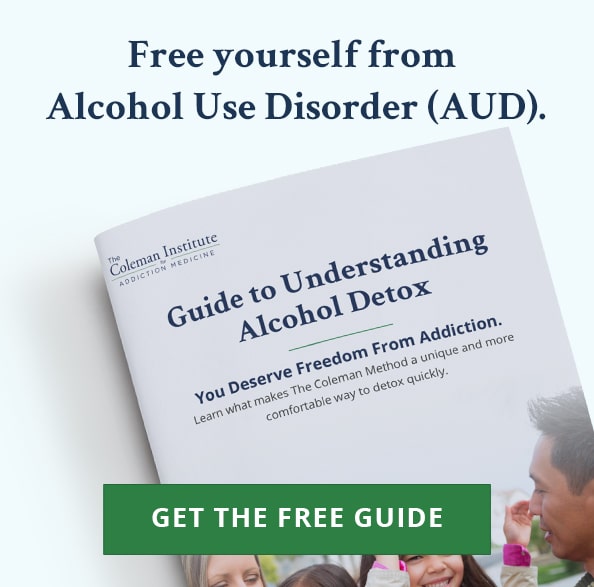
Naltrexone Therapy for Alcohol FAQs
- What is Naltrexone therapy and why is it important for alcoholism?
- How does naltrexone work on opioid receptors to treat alcoholism?
- Can individuals who are still drinking or those who are physically dependent on alcohol start Naltrexone therapy?
- Is Naltrexone therapy Medication-Assisted Treatment (MAT)?
- Are there interactions between Naltrexone and other medications I should be aware of?
- How long should I be on Naltrexone therapy?
- How do I know if Naltrexone therapy is right for me?
1. What is Naltrexone therapy and why is it important for alcoholism?
Our three-part approach to recovery is here to help you win your battle against Alcohol Use Disorder and be free to enjoy your life again. From our experience, detoxing is the first step toward this goal, rather than the achievement of it. We want to help you stay in recovery for the rest of your life, so we focus on connecting you to the resources you need to do so. In addition to helping you find individual professional therapy and supportive group treatment, we recommend Naltrexone to help block your alcohol cravings. Naltrexone is a non-addictive, non-narcotic medicine that attaches to the opiate receptors in your brain, which contribute to the pleasurable effects you feel when drinking alcohol. When Naltrexone blocks these receptors, you can feel reduced cravings. With Naltrexone helping to support sobriety, patients are better able to abstain from drinking and focus on their recovery program.
2. How does naltrexone work on opioid receptors to treat alcoholism?
Naltrexone works by targeting the brain’s opioid receptors. While these receptors are primarily known for their role in pain and opioid use, they are also involved in the rewarding effects of drinking alcohol. When someone with an Alcohol Use Disorder takes naltrexone, the drug binds to these opioid receptors, effectively blocking the pleasure and reward sensations typically associated with alcohol consumption. This can reduce the craving and desire to drink alcohol.
3. Can individuals who are still drinking or those who are physically dependent on alcohol start Naltrexone therapy?
Naltrexone is typically prescribed to individuals who have already stopped drinking or are in the process of doing so. If someone is physically dependent on alcohol and stops drinking abruptly, they may experience withdrawal symptoms. Naltrexone is not designed to address these withdrawal symptoms, so it’s crucial to be under a medical professional’s supervision when starting the medication, especially if one is still drinking or at risk of withdrawal.
4. Is Naltrexone therapy Medication-Assisted Treatment (MAT)?
Naltrexone is indeed a form of MAT. Medication Assisted Treatment is a comprehensive approach to treating substance use disorders, combining behavioral therapy and approved medications. MAT using Naltrexone helps block the euphoric and reinforcing effects of alcohol in the brain. By diminishing the rewarding effects of alcohol, Naltrexone can help people reduce their alcohol intake, maintain abstinence, and stay in recovery.
5. Are there interactions between Naltrexone and other medications I should be aware of?
Yes, while Naltrexone is effective in treating excessive alcohol use, it can interact with certain medications that might either increase or decrease Naltrexone’s effects. It is vital to inform your healthcare provider about all the medications, over-the-counter drugs, and supplements you are taking to ensure a safe and effective treatment plan.
6. How long should I be on Naltrexone therapy?
We strongly believe that patients should be on Naltrexone therapy for at least 12 months after completing their detox. Recent research shows that it takes a year or more for the brain to fully heal from addiction. And we also know that it takes at least a year for people to learn about alcoholism and recovery, build up a support system, and integrate all of the recovery changes into their lives. Having Naltrexone therapy during the first stages of recovery helps reduce the risk of patients relapsing while giving them time to invest in their long-term health.
7. How do I know if Naltrexone therapy is right for me?
Deciding on the best treatment for Alcohol Use Disorder is a personal decision that should be made in consultation with a medical professional. If you’re considering Naltrexone therapy, it’s important to discuss your drinking habits, current medications, health conditions, and concerns with a healthcare provider who is familiar with treating alcohol dependency and addiction. They can provide guidance on the suitability of Naltrexone for your specific situation and help devise a comprehensive treatment strategy tailored to your needs.
Let’s Take the Next Step Together.
Have questions or want to learn more? Contact us today at 804-294-2212.


